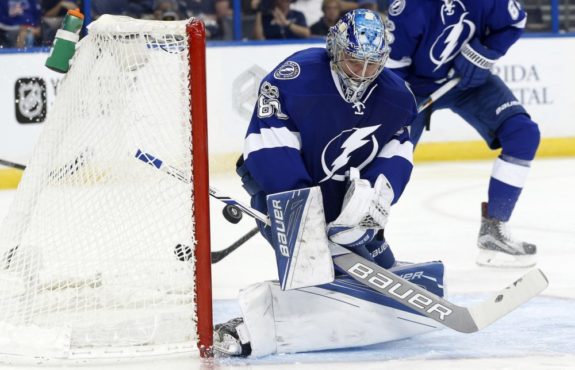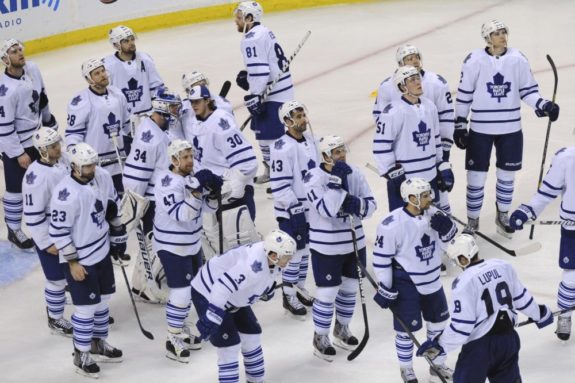The Toronto Maple Leafs have been locked into the third Atlantic Division playoff spot for what seems like forever. Now, with just one game to go in their 2017-18 National Hockey League season, they seem destined (assuming the Boston Bruins continue their strong play and finish first) to play the Tampa Bay Lightning in round one.
Though the Floridians were a Stanley Cup favourite before the season, have flirted with first place in the league and have several players in serious contention for major awards, the Leafs should be licking their chops for the chance to play the Lightning.
Lightning Struggling to Calm Storm
On the surface, this seems asinine; the Leafs are 3-1 against the Bruins this season, and 7-1 the past two years combined. Meanwhile, they are just 1-2-1 against the Bolts in 2017-18, and 3-4-1 over the last two seasons. Clearly, Boston seems like the better matchup.
However, the Lightning have slowed considerably in recent weeks, leaving them vulnerable to an explosive Leafs team heavily influenced by momentum. Sure, Tampa is 53-23-4 for the season, but much of that record was based on early success, having gone 29-8-3 in their first 40 games.
Lightning Fading in Back Half
In the past 40 games, the Lightning have simply not been playing the same calibre of hockey. Despite a still-good record of 24-15-1, said record is not nearly as frightening of that of their first 40.
Many Lightning statistics have come back down to Earth, as well.
Take their powerplay, for instance. Second in the league through the first half at 24.8 percent, it has since dipped to 23.6% and a very average 13th.
The dropoff in Tampa’s penalty kill has been even more pronounced, falling from 79.7% – an already mediocre 23rd – to 72.7% and second-last in the NHL.

Yes, the team sports a very healthy plus-55 goal differential – tied for first with the Bruins and Nashville Predators, on the back of 281 goals for and 226 against. However, in their 40 games since Jan. 2, the Lightning have a goal differential of just plus-3. Yes, three. 136 for and 133 against.
Goal-scoring has not decreased dramatically; the problem has, very clearly, been team defense and a curious propensity to allow games to be closer than they probably should be.
Through their first 40 games, Tampa Bay allowed just 93 goals, or 2.33 per game. In the last 40, the Lightning have allowed 133, or 3.33 per game. Yikes.
Lightning Goaltending Shocked and Awed
A massive part of the Lightning’s defensive game is goaltender Andrei Vasilevskiy, who was an early-season favourite for the Vezina Trophy.
Nearly unbeatable through the team’s first 40 games (of which he started 33), Vasilevskiy registered 26 wins and an almost unheard-of .939 save percentage.
Since then, in 30 starts, Vasilevskiy has won just 17 times, throwing up a .902 SV% along the way. He’s admitted his first season as a number-one netminder has left him “tired,” calling into question his ability to re-establish his game in time for the playoffs. If the Lightning rest him during their last two games, they risk letting him rust. If they play him, they risk burning him out ahead of the postseason. Not an enviable decision to have to make.

The offensively gifted Leafs should be salivating at the opportunity to face a potentially rattled goaltender with a clearly porous team in front of him.
Related: Vasilevskiy Salvaging End of Season
Leafs’ Alternative Bad News Bears
Meanwhile, the Bruins, the only other team the Leafs could face in the first round, started off the season hot – and have kept up their torrid pace, rampaging down the stretch towards an Atlantic Division title with a 26-8-6 record in their last 40 games.
Additionally, the Leafs and their fanbase are no doubt acutely aware of the added pressure of a Boston-Toronto matchup; the spring of 2013 saw the Bruins rally from a three-goal third-period deficit to beat the Leafs in Game 7 of their first-round series. While it would surely exorcise a lot of demons to avenge this heartbreaking defeat, the Leafs could really do without the added pressure when they are already potentially overmatched.

Really, the only possible advantage to facing the Bruins would be the fact Boston has a back-loaded schedule this season, a condition made more severe by the fact a Jan. 4 snowstorm forced the rescheduling of a Bruins game to Apr. 8, after everyone else has already finished playing.
Heavy schedule or not, the Bruins show no signs of slowing down. The Leafs had best hope for Tampa Bay, as I don’t think any team wants to get in the way of this bear.
Related: This Bruins Team Seems Destined for June
Leafs Can Bring Thunder Against Lightning
The above analysis may all be academic; after all, the Lightning, flaws or not, have continued to win despite their struggles – including a 4-0 Vasilevskiy shutout over the Bruins on Tuesday. Tampa Bay could well still win the Atlantic.
However, if the Leafs could choose between the two juggernauts atop their division to play in a seven-game series, I’m not so sure they wouldn’t put regular-season history – and conventional wisdom – aside and elect to take on Tampa Bay.
(If you’re perusing NHL.com and wondering why the goal differential numbers aren’t the same as above, the official standings page counts the winning goal from shootout games in its tallies. Most other sites are run competently and do not count these “goals” in their tabulations.)